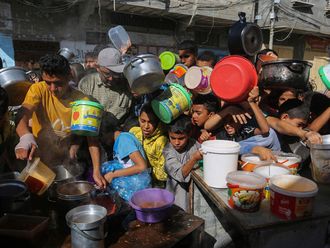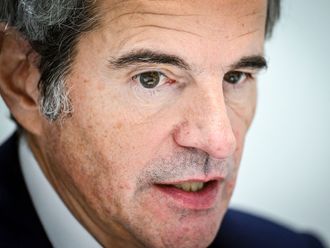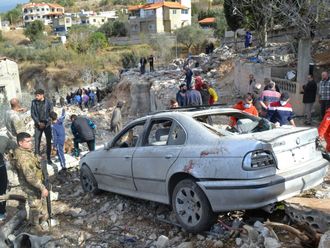
Ramadi, Iraq: A female suicide bomber blew herself up at the entrance to government offices in the western Iraqi city of Ramadi on Sunday killing at least four people, the interior ministry said.
The attack comes amid a surge in violence which in past weeks has swept the province of Al Anbar and its capital Ramadi, shattering a long period of relative calm in what was once the epicentre of Al Qaida activity and Sunni insurgency.
"At least four people were killed and 23 others wounded, including women and children, by a female suicide bomber at the entrance to the provincial government building," an interior ministry official said.
Local officials could not immediately confirm the toll.
Mohammad Fat’hi, a spokesman for Al Anbar provincial authorities, quoting initial hospital reports, told AFP earlier that at least 10 people were hurt in the attack west of Baghdad.
Al Anbar, which in the first years after the US-led invasion became the theatre of a brutal war focused on Fallujah and Ramadi, calmed dramatically after Sunni Arabs there turned against Al Qaida in 2006 and began what was to grow into a nationwide anti-Al Qaida Sahwa, or "Awakening", militia.
But the past weeks have seen a resurgence of violence, with troops on Tuesday killing a suicide bomber east of Ramadi, thereby foiling a multiple attack on worshippers gathering before dawn for prayers.
That same day a roadside bomb killed the vice chancellor of Ramadi's Islamic University, Ahmad Juma’a, and wounded two other people in the nearby Euphrates Valley town of Hit.
And on Wednesday two gunmen attacked Major Salam Khalifa, a police commander from Ramadi, as he was walking with his wife and friend in the centre of Hit.
Seven Iraqi soldiers were killed on June 18 in an ambush in Akashat near the Syrian border.
US and Iraqi officials had warned of the dangers of an upsurge of violence if negotiations on forming a new governing coalition some four months after an inconclusive general election drag on too long, giving insurgent groups an opportunity to further destabilise the country.
Government statistics released Wednesday however indicated an opposite trend, showing that 284 people were killed in political violence across Iraq in June, compared with 337 civilians, police and soldiers who died in violence in May.











